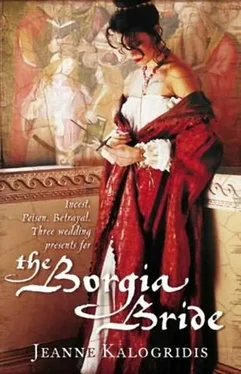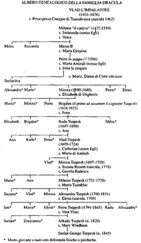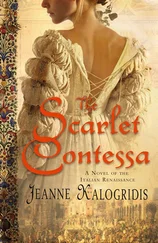‘A D’Este,’ I whispered. My cousins in the Romagna. Cesare never dared attack them; their army was too strong. He had long ago told me that he would prefer to make them his allies.
‘Cesare likes the arrangement, because he thinks it will bring him more soldiers,’ Lucrezia confided. ‘I was required to visit them, so the old duke, my potential father-in-law, could be assured I was a “Madonna of good character”, as he put it.’ She gave a wry, fleeting smile. ‘I passed old Ercole’s test. But what I did not tell Father or Cesare is that the D’Estes will never be convinced to fight for the papacy. They are good Catholics, but they are wise: they do not trust Pope Alexander or his Captain-General.
‘Duke Ercole insists that I go to Ferrara to wed his son, and live there afterwards, which I have agreed to eagerly. I will never again return to Rome. I will stay with my new husband, surrounded by a strong family and a strong army which cannot be bent to the Borgias’ will.’ Her voice grew laden with emotion. ‘His name is Alfonso.’
It took me a moment to realize that she had uttered the name of her intended groom: Alfonso d’Este, my brother’s cousin.
‘So you see,’ she continued, ‘this is to be our last meeting, Sancha.’ She regarded me with sad affection. ‘If there was only something I could do to help your circumstances…’
‘There is,’ I answered immediately. ‘You can do me one final act of kindness.’
‘Anything.’ She waited, eager, expectant.
‘You can tell me how much of the canterella it takes to kill a man.’
She was utterly startled at first, then composed herself and grew very still. Through the distant look in her eyes, her expression, I watched her travel back to the convent of San Sisto, where she had been pregnant with Cesare’s child, and so filled with despair that she planned to end her life.
I watched her recall the missing vial of poison.
She studied me intently then; our gazes met, both steady. In that wordless exchange, we shared complicity in a plot as solid, as explicit in goal as any hatched by her brother and father. To kill a man , I had said. She knew, from the resolve in my shoulders, in the upward tilt of my jaw, that I had no intention of using the vial’s contents on myself.
I was never so sure of her loyalty, or her gratitude.
‘Only a few grains,’ she replied at last. ‘It is extremely potent. It is slightly bitter, so sprinkle it onto food-something sweet, like honey or jam, or directly into wine. That way, the victim cannot taste it.’
I gave a slow nod. ‘Thank you.’
In the next instant, it was as though we had never spoken of such things; her expression changed abruptly. A look of yearning crept into her eyes, a plea. I countered quickly before she could ask the question:
‘Do not ask me for forgiveness, Lucrezia, for I can never give it.’
The last flicker of hope in her eyes died, like a flame extinguished. ‘Then I will pray to God for it,’ she said solemnly. ‘And I will ask only that you remember me.’
I yielded then. I stepped forward and embraced her tightly. ‘That I can do.’
She wrapped her arms about me. ‘Good-bye, Sancha.’
‘No,’ I responded sadly, my cheek against hers. ‘This is farewell.’
Preceding Lucrezia’s departure for Ferrara, there were numerous celebrations in the city. Dorotea and I watched from the loggia on clear nights as all manner of sumptuously-dressed nobles and dignitaries processed through the streets and piazzas to the Vatican, on their way to pay their respects to the bride-to-be. There were fireworks, and cannons; Dorotea enjoyed the distractions, but they only fuelled my hatred.
One morning, as I sat in my antechamber reading, the doors to my apartment opened. I looked up, annoyed at the unannounced intrusion.
Cesare Borgia stood in the entrance.
War had aged him, as had the pox; even his beard, which now bore traces of premature silver, could not hide the prominent scars on his cheeks. There were streaks of silver as well in his hair, which had begun to thin, and shadows beneath his jaded eyes.
‘You are as beautiful as the day I first saw you, Sancha,’ he said, his voice wistful, soft as velvet. His flattery was wasted. My lips twisted at the sight of him; surely he could only bear evil news.
Then I saw the solemn little boy holding his hand, and let go a sound that was both a laugh and a sob. ‘Rodrigo!’ I threw down my book and ran to the child at once.
I had not seen my nephew in more than a year, but recognized him immediately; his golden curls and blue eyes were unmistakably my brother’s. He had been dressed in a princely little tunic of dark blue velvet.
I sank to my knees before him and spread my arms. ‘Rodrigo, my darling! It is your Tia Sancha, do you remember me? Do you know how I love you?’
The little boy-almost two years of age, now-turned away at first, and rubbed his eyes with his fists, embarrassed.
‘Go to her,’ Cesare murmured encouragingly, and nudged the boy towards me. ‘She is your aunt, your father’s sister…She and your mother loved each other very dearly. She was present the day you were born.’
At last Rodrigo seized me with impetuous affection. I enfolded him in my arms, not understanding why Cesare was granting this precious visit, and for the moment not caring. It was pure bliss. I pressed my cheek against the child’s down-soft hair as Cesare spoke, his tone uncharacteristically awkward.
‘Lucrezia cannot take the child with her to Ferrara.’ It was not the custom to permit a child from a previous marriage to be raised in another man’s household. ‘She has asked that you raise him as your own. I did not see the harm in it, and so I brought him.’
Despite my joy, I could not resist hurling a barb. ‘A child ought not be raised in a prison!’
Cesare answered with astonishing mildness. ‘It will not be a prison for him, but a home. All privileges will be accorded him; he will be free to come and go, to visit his grandfather and uncles whenever he wishes. Anything he needs will be provided at once, without question. I have already arranged for him to have the best tutors when the time comes.’ He paused, then the cool, arrogant tone I knew so well resurfaced. ‘He is, after all, a Borgia.’
‘He is a prince of the House of Aragon,’ I said heatedly, without easing my hold on the boy for an instant.
At that, Cesare graced me with a thin smile, but there was only humour, no malevolence, in it. ‘Servants will be arriving soon with his things,’ he added, then left me to ponder how such a monster could at times be so human.
I called for Donna Esmeralda, to show off my newest, most precious jewel; the two of us covered the bewildered child with kisses.
Lucrezia had betrayed me and Alfonso had died, but they had left me the greatest of all gifts: their son.
From that moment, all traces of my madness disappeared. Little Rodrigo restored my hope and purpose. I realized that I had not destroyed all that I loved; and I began to entertain the idea of escaping with the child to Naples, ruled now by King Ferdinand of Spain. I could never return to the Castel Nuovo, but I would not be unwelcome in the city I so adored. My mother, my aunts, and even Queen Juana still lived there. I would be among family there. The women who had known my brother could now know his son.
I had the weapon to achieve my goal; thanks to Lucrezia, I had the knowledge to use it. Only one thing remained: the means to deliver it. Now that sanity had returned, I remained patient, willing to bide my time, to consider carefully how to fulfil the destiny the strega had foreseen.
I spent my days caring for Rodrigo. It took him time to accept that he would not see his mother again; most of all, he missed his nurse, who had gone as part of Lucrezia’s entourage to Ferrara. Many nights he kept Donna Esmeralda and me up with his crying-but in truth, I slept better than I ever had before the child’s arrival. Happily, Jofre enjoyed his nephew’s company as well; he was fond of playing with the child, and on those evenings my husband came to dine, he carried Rodrigo to bed.
Читать дальше
Конец ознакомительного отрывка
Купить книгу












